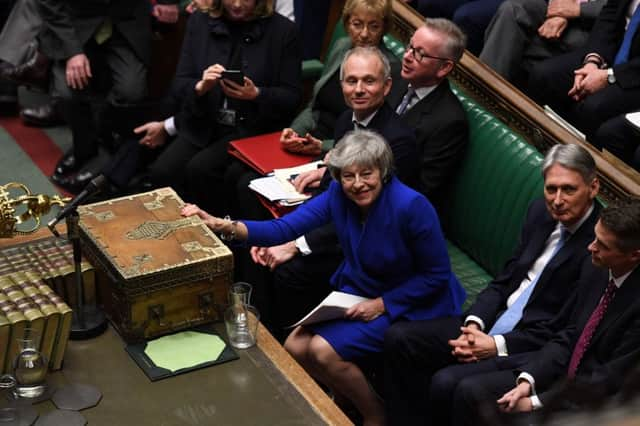May forced to make ?concessions but refuses to budge on red lines


But the Prime Minister stood firm on her red lines as she set out her “Plan B” following the government’s crushing defeat last week.
Mrs May ruled out a second EU referendum, warning it would boost demands for another vote on Scottish independence and undermine the “social cohesion” of the UK as she faced questions over whether army reservists called up to support Brexit preparations would be armed.
Advertisement
Hide AdAdvertisement
Hide AdBut despite growing demands for the government to honour a vote next week in which MPs could demand a delay to Brexit, Downing Street said the move would not be legally binding, while the Prime Minister said it would amount to a bid to stop the UK leaving the EU.
Appearing before MPs to meet a requirement set by parliament following the 230-vote defeat of her proposed Brexit deal, Mrs May announced that EU citizens would no longer need to pay £65 to apply for settled status, allowing them to live and work in the UK beyond 2020.
Amid continuing deadlock over the controversial insurance policy for the Irish border, the government’s approach to the backstop remains unchanged, with the Prime Minister saying she would take concerns back to Brussels following fresh talks with the DUP and other MPs.
Offering an “enhanced role” for devolved administrations, Mrs May said she would hold meetings with Nicola Sturgeon and the Welsh First Minister Mark Drakeford this week.
She also promised a greater role for parliamentary committees, with MPs getting to see more internal government information on Brexit on a confidential basis.
Parliamentarians will now put forward amendments to a government motion setting out which course they believe the Prime Minister should take, although the outcome of any votes on 29 January will not be legally binding.
Following reports the government would seek to reopen the 1998 Belfast Agreement that cemented the Northern Irish peace process, Mrs May told MPs: “I have never even considered doing so – and neither would I.”
Mrs May insisted her approach to Brexit had changed as a result of the government’s crushing defeat and following talks with opposition parties and backbench MPs, which Jeremy Corbyn has boycotted.
Advertisement
Hide AdAdvertisement
Hide AdThe Labour leader said he would not take part until a no-deal Brexit was taken off the table, a position also taken by the SNP following an initial meeting between Mrs May and Westminster leader Ian Blackford.
Responding to the Prime Minister, he said there should be “no more phoney talks”.
Mr Corbyn told MPs: “The Prime Minister must change her red lines because her current deal is undeliverable.”
The Prime Minister pledged: “We will be more flexible, open and inclusive in the future in how we engage parliament in our approach to negotiating our future partnership with the European Union.
“Second, we will embed the strongest possible protections on workers’ rights and the environment.
“And third, we will work to identify how we can ensure that our commitment to no hard border in Northern Ireland and Ireland can be delivered in a way that commands the support of this House and the European Union.”
Mrs May said no-deal couldn’t be taken off the table without eventually revoking Article 50, warning this would “go against the referendum result”.
Unusually, MPs will be able to amend the so-called “neutral motion” being tabled by the Prime Minister.
Votes will take place on 29 January.
Advertisement
Hide AdAdvertisement
Hide AdOne group, including senior Labour MP Yvette Cooper and Tory former minister Nick Boles, is seeking to give time for a Bill to suspend the Article 50 withdrawal process if there is no new deal with Brussels by the end of February.
Another more radical amendment drawn up by former attorney general Dominic Grieve would allow a motion by a minority of 300 MPs – from at least five parties and including ten Tories – to be debated as the first item of Commons business the next day.